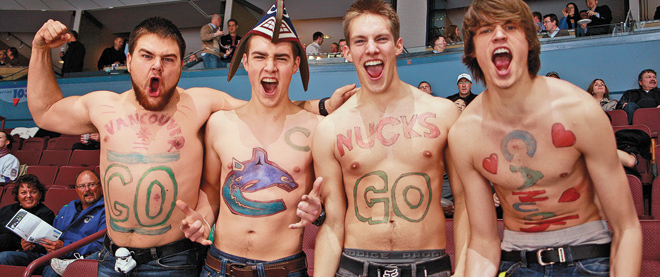Outsiders don’t get us and hockey
A groundbreaking new guide looks at the nuances of our national obsession in literature
Share

As if anybody needs them during playoff season, here are a few reminders of how inescapable hockey is in Canada. On our $5 bill, in a spot where another country might offer an old Latin motto, there’s a bilingual quotation from Roch Carrier’s short story “The Hockey Sweater.” When Michael Ignatieff wrote an essay about Canada’s two solitudes, back before he entered politics, his epiphany about the language divide occurred—where else?–in a Trois-Rivières, Que., hockey arena. Not to be outdone, Prime Minister Stephen Harper burnishes his image by letting it be known that he toils during spare moments over some sort of history of the game.
All these examples concern writing about hockey, rather than lacing ’em up and actually playing. The national obsession has, in recent decades, inspired an outpouring of prose that Jason Blake aims to make sense of in his new, groundbreaking book Canadian Hockey Literature. Despite the rather generic title, this is no dry critical survey. Blake is an engaging guide, not just to obvious highlights—like Mordecai Richler weaving hockey into some of his best scenes—but also to examples a reader might easily skate right past—like Alice Munro naming streets for original-six NHL teams in her superb story “The Bear Came Over the Mountain.”
First-line talents like Richler and Munro slip hockey into their fiction effortlessly. At least, it seems that way to Canadian readers. Outsiders don’t always get it. A British book reviewer, for instance, praised Richler’s novel Barney’s Version, but found fault with the title character’s hockey obsession, which he deemed unrealistic in so intelligent a protagonist. Blake contrasts that misguided skepticism with the perspective of a Canadian critic who saw nothing odd, of course, in a sophisticated character loving hockey, but “found it incredible that decrepit Barney executed a tap dance.”
Blake is insightful on how hockey provides a private dialect for Canadian readers. That doesn’t exclude non-Canadian audiences, he suggests, but cuts them out of nuances. This must be particularly true about the way violence is treated. Anyone who hasn’t watched much hockey would miss the layers of Hanford Woods’s story “The Drubbing of [Eric] Nesterenko,” which makes creative use of the infamous beating the Montreal Canadiens’ enforcer John Ferguson laid on the Chicago Blackhawks centre in 1965. “The horror,” Blake observes, “comes from seeing Ferguson cross the line of accepted violence, and is worsened because Ferguson attacks a favourite player.” Uninitiated readers would have to take it on faith that hockey fights are usually too cartoonish to be truly horrifying.
Violence is a core theme in hockey fiction. In Mark Anthony Jarman’s Salvage King, Ya!—a novel Blake admires as much as discerning critics before him have—a player takes up brawling only to prolong his career. “The same sort of violence that is tacitly or openly applauded in real hockey,” Blake says, “is represented as a corruption of the game in fiction.” As idealized on the page, hockey’s heart is pure. The game can even transcend money, and not only in stories. “For Canadians,” Blake observes, “playing hockey is not a social or class statement in the way that golf or skiing is, even though the expenses are similar.”
Yet he doesn’t go overboard. Canadian Hockey Literature touches on novelist David Adams Richards’s extravagant claims about the game’s importance, and mentions Roch Carrier’s doctrine that “you can explain everything through hockey,” but Blake is more restrained. (Although a Canadian, he’s a literature professor in, of all places, Slovenia.) He sees hockey’s quotidian side. Deeply rooted as it may be in Canadian folklore, Blake notes that TV networks market it as “an entertainment media bulwark of Canadianness against the tempting American television shows we watch the rest of the week.”
Still, hockey was around before TV, even before radio, and long before all the stories and novels Blake mines for meaning. The title character of the late Paul Quarrington’s brilliant novel King Leary captures hockey’s timeless quality best after he listens to an American hold forth on the game’s origins in soccer and lacrosse. “I bit my tongue,” King says, “but the truth of the matter is, I never knew that hockey originated. I figured it was just always there, like the moon.” A sentence like that makes a Canadian want to play some shinny, or at least read about it.